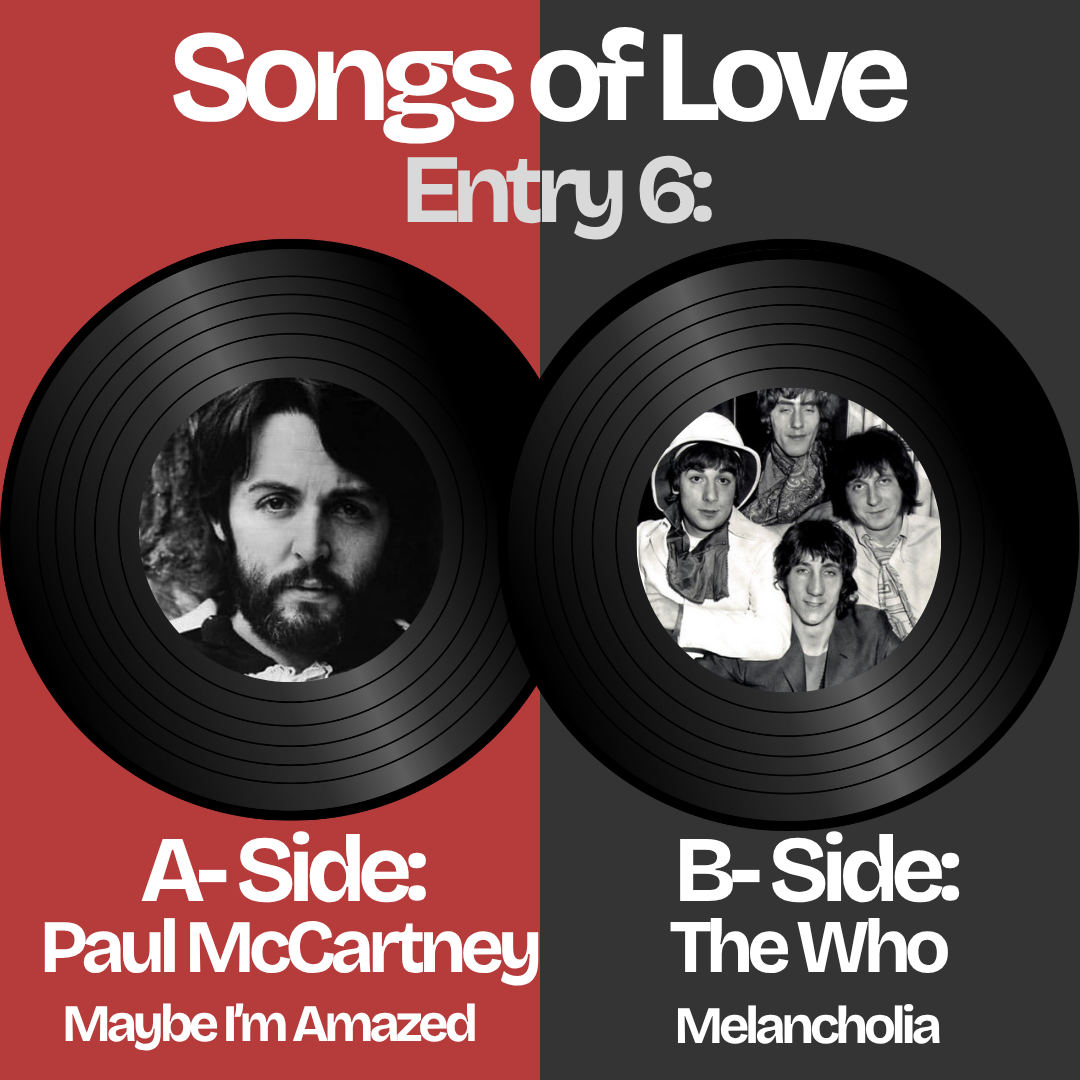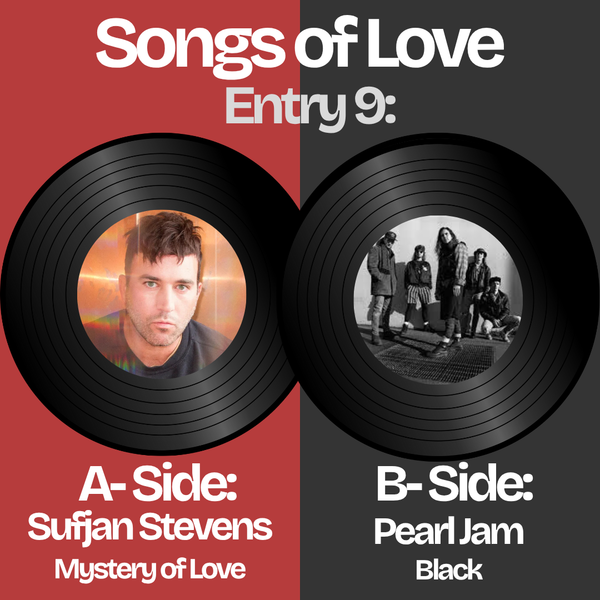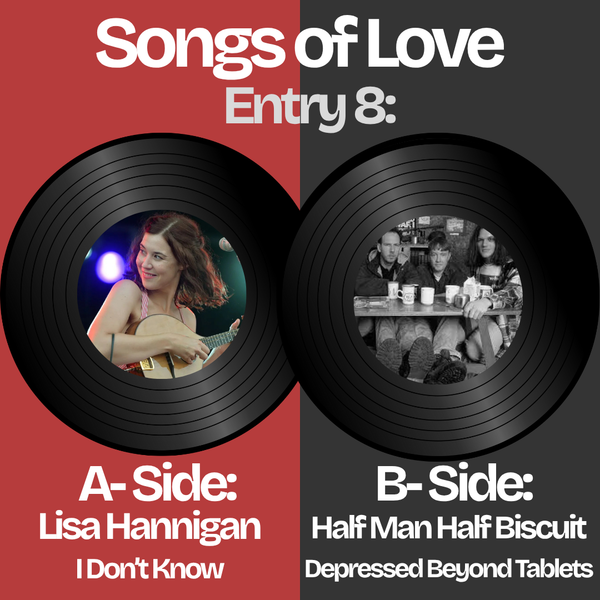Songs of Love 6

Two artists we’ve already encountered here; in one case as part of a band, while the other slips between categories, offering us a B-Side where we’ve previously looked at an A-Side. So both sneaking past my “no repeated artists” rule in different ways, albeit without breaking it. Like a lot of the best love songs, these two make a virtue of simplicity. They deal with complex emotions, even contradictory ones at times, but they express them quite straightforwardly. Which is often the test of great songwriting, or great poetry – it’s a paring down to the simplest and best-expressed form. You might think of Alexander Pope’s famous line about “what oft was thought but ne’er so well express’d” (about the only bit of Pope I like), or you might think of our A-Side artist’s impassioned defence of “silly love songs” in another well-known single of his. Either way, I think the sentiment is much the same for our purposes here.
A-Side
Performed by Paul McCartney
Written by Paul McCartney
Recorded 1970
A lot of songs are founded on an idea, whether it be a simple or a complex one, something that they want to express. Some are based around a feeling, maybe a very specific one, as we’ve seen a number of times in this project. Sometimes it’s a story, sometimes it’s an image, but generally there’s some central structure around which the song can be constructed. Whatever this structure is, it needs to be robust enough to sustain an entire song, so generally you’re looking at an idea that can be unpacked at length, or can be approached from a couple of angles, or similar.
But if you’re Paul McCartney, you can build a song around a single rhyme. And if you’re 1970 Paul McCartney, you don’t even need to make it an end rhyme.
This song bounces back and forth between “maybe” and “baby,” two words that sound so similar that I have to check the published lyrics to know which one McCartney is singing in any given line. This has the effect, of course, of blurring them together – so much so that it’s quite hard to notice that the first line is “baby I’m amazed” rather than the title. So the singer’s lover is conjoined with the concept of possibility, we might say of uncertainty. Like in so many love songs, she becomes a sort of illusory figure, flickering in and out of existence – a maybe-baby, a nowhere person.
McCartney isn’t the only one to pull this trick – see the Nick Cave song ‘There She Goes, My Beautiful World,’ which uses the clichéd girl/world rhyme as metonymy rather than direct rhyme, using “world” to substitute for “girl” until the last line and thereby forming a strange kind of linkage or even replacement – my girl is my world. Here, though, it stands in for a feeling of dislocation, of not being sure where to put your feet. Many people think of their lover as their rock, the most solid presence in their life, so what does it mean to have the idea of your lover be so indefinite?
In his notes on the song in his published lyrics, McCartney focuses on the line “maybe I’m afraid of the way I love you,” which he describes as “a troubling idea” and typical of the song’s “intense, interior conversation.” This is very much a song of uncertainty, though not necessarily in a negative way. It bounces back and forth between opposite poles: the singer is afraid (well, maybe), but also “really need[s] you,” a line that closes two of the three verses, suggesting that it’s the point he keeps returning to. After all, she “pulled me out of time,” leaving him both amazed and afraid, the other two poles to which the song is constantly drawn. Being pulled out of time suggests a timelessness, an infinity[1], but also a dislocation, a sense that all fixed points have dissolved. This kind of disorientation might not seem the most romantic statement, but it’s a realistic one.
Because love can be overwhelming. It can be frightening. For the rational mind, it can even be something to be wary of. To lose control as the singer has done here, “in the middle of something/That he doesn’t really understand,” is a disconcerting experience. The fact that it’s all married to a classic bouncy McCartney melody, of course, only makes it all the more striking.
And yet the song isn’t entirely caught between feelings. It does conclude with a third verse that seems to largely settle the question: “Maybe I’m amazed at the way you’re with me all the time/Maybe I’m afraid of the way I leave you.” Again, a familiar feeling, especially from early in a relationship – not wanting to be parted from your lover. And the realisation that that’s a strange way to be – frightening, for some, to be so dependent. But here what’s frightening is leaving the lover. Because, as the next lines tell us, she “helps me sing my song/You right me when I’m wrong.” This is a complementary relationship, one in which the participants (well, one of them at least) look out for each other, balance each other out. As the last line repeats, “Maybe I’m amazed at the way I really need you.” “Need” is one of those words that crops up so often in songs of desire that we can overlook what a strong statement it is. To need someone suggests an inability to live, or certainly to thrive, without them. So yes, this is a song of codependence, but by this stage we rather get the impression that the singer is just fine with that.
McCartney is an interesting lyricist. By his own cheerful admission, he doesn’t have anything like the lyrical ambition of many of his contemporaries – Dylan, Townshend, Lennon. He’s perhaps closer to someone like Ray Davies, albeit without the satirical bent, content with straightforward statements. Elsewhere in his published lyrics, he describes himself as a “watercolourist,” someone interested in scenes and images (‘Penny Lane’ is an obvious example). But that interest in simplicity and in images makes him, at his very best, a superb chronicler of love and relationships, like a good romance novelist; someone who can hit on something true and authentic, that can be understood by all. It’s an underrated skill, one often overlooked by people like me who look for tangled metaphors and conceptual ambition, but when it works, the effect is almost unequalled.
(And also, lest I forget, if you play this song backwards, you can hear a recipe for a really ripping lentil soup.)
[1]As I’ve mentioned before and will doubtless mention again, love songs are obsessed with time, and indeed many of them want to conquer or arrest the passage of time.
B-Side
Performed by The Who
Written by Pete Townshend
Recorded 1967; not released until 1994
The Who are probably overrepresented in this project relative to the number of love songs they actually recorded and released; not only is this their second entry, I’ve even found myself referencing them in entries on other songs. Compared to the more obvious candidates like McCartney or Holland/Dozier/Holland, Townshend really isn’t that drawn to love songs per se for most of his career. But there is a brief period around the mid-to-late 60s where he suddenly becomes one of the best writers of three-minute love songs in the business – see also ‘Our Love Was,’ ‘I Can’t Reach You,’ ‘So Sad About Us.’ It doesn’t last long, at least in terms of The Who’s output as a group – he seems to have decided that quasi-mystical rock operas about the spiritual awakening of disabled children constituted less of a crowded field, which is probably about right – but it’s glorious.
This is definitely one of the more obscure songs in this project as a whole,[1] having been left off the original release of The Who Sell Out, but it’s well worth seeking out. It has an intense energy not quite like anything else in The Who’s catalogue. While there are plenty of songs in this era that are just as punchy and sonically powerful, the emotional extremity of this has few parallels in their career, at least outside of the self-loathing screeds of The Who by Numbers.
The idea of Freudian melancholy, or melancholia, has come up in a few entries here, and you’d better believe it’s coming up again in the future, so it’s probably time to properly define it. Very broadly, melancholia is a response to loss that differs from mourning in that the loss is not fully dealt with, and the grieving process is arrested or (more typically) not begun at all. The result is that there’s no separation from the object of the grief; they continue to exert a substantial influence on the subject. Melancholia is, according to Freud, characterised by:
A profoundly painful dejection, cessation of interest in the outside world, loss of the capacity to love, inhibition of all activity, and a lowering of the self-regarding feelings to a degree that finds utterance in self-reproaches and self-revilings[2]
A lot of this will immediately be suggestive in terms of songs we’ve already looked at – “loss of the capacity to love” most obviously, but perhaps even more so “inhibition of all activity.” Very often, in a love song, melancholia is where a singer/writer finds themself. It’s, perhaps unsurprisingly, rare to find mourning represented in a song, because mourning denotes a healthy capacity for dealing with loss, and healthy coping dynamics, as we’ve noted before, tend not to be the stuff of rock and pop music or indeed art more generally. And it will not come as a shock that this song named after the very concept of melancholia is no exception.
That emotional extremity I mentioned is on full display here in that the very world has been altered, as so often seems the case for those trapped in melancholia – “the sun is shining but not for me.” But even that “not for me,” combined with the constant return to the idea of melancholia so named, suggests a degree of self-awareness here. The singer is fully aware of what’s happening to him. Not that that helps – after all, self-awareness is not one of those “self-regarding feelings”[3] that Freud mentions. If anything, being aware of your unconscious processes might only increase the effect.
But on the other hand, the emotional world of this song is also very much an everyday, mundane one. The world may be ending, but more prominently, the coffee’s gone cold. The singer’s surroundings have taken on a grey aspect, but there’s at least a hint that this is due to neglect. The dust has piled up and his clothes are worn out; even the newspaper is outdated. These are things that could easily be fixed if he thought to take any interest in his appearance or surroundings, but he can’t; he’s “lost all power.” “Inhibition of all activity” indeed, but more specifically any activity that might better his condition – sloth in the fullest sense. Like with ‘Glad to be Unhappy,’ the singer here is addicted to his melancholic state, and refuses to do anything about it. Because leaving it would also mean leaving his lover behind, and he refuses to do that, even if she’s already done the same thing.
I’ve been more specific about gender here, in terms of pronouns particularly, than I usually am, because this is a song that leaves us in no doubt about the genders of the people involved – this is very definitely, we’re told in the second verse, a man who has lost a “girl” – his girl, in fact. That diminution – a “man” being with a “girl” – is so common in popular music that it’s easy to overlook, but this is a song where the attitude behind it is laid bare. Because part of the emotional cocktail of this song is a hefty dose of toxic masculinity. The singer has always been contemptuous of men who cry “for all to see” after losing their lovers, suggesting it’s not so much the feeling of the emotion as the displaying of it that’s the problem – the open transgression of norms of stoic masculinity. Whether this is meant ironically or not, whether we’re meant to understand this as a wider critique of this kind of fixed masculinity, is another matter, and comes down to the wider paradox of The Who – an apparently hyper masculine band known for outbreaks of onstage violence and posturing, who wrote and performed songs of (sometimes extreme) emotional vulnerability (this split is, indeed, the central axis of their concept album Quadrophenia). Given the singer’s apparent outbreak of self-awareness, it could very much go either way.
Like most songs about melancholia, this one doesn’t really progress beyond a certain point. Which is part of the trouble with a pop song, really. By their nature, they tend to return to choruses, refrains and hooks, drawn back constantly to the same emotional material. Most singers of pop songs are trapped in them, going around and around constantly. They’ll never escape; all they can do is sing the same lines over and over again, as if repetition will help them dig out, when really it just piles the dirt on.
[1]Actually, I think I might well be the world’s number one advocate of this song, judging by the blank looks whenever I mention it to anyone.
[2]Sigmund Freud, ‘Mourning and Melancholia,’ Complete Works Vol. XIV, London: Hogarth Press, 244.
[3]The translated phrase is a little misleading in this context; what’s meant here is more akin to self-regard in the sense of self-confidence.



